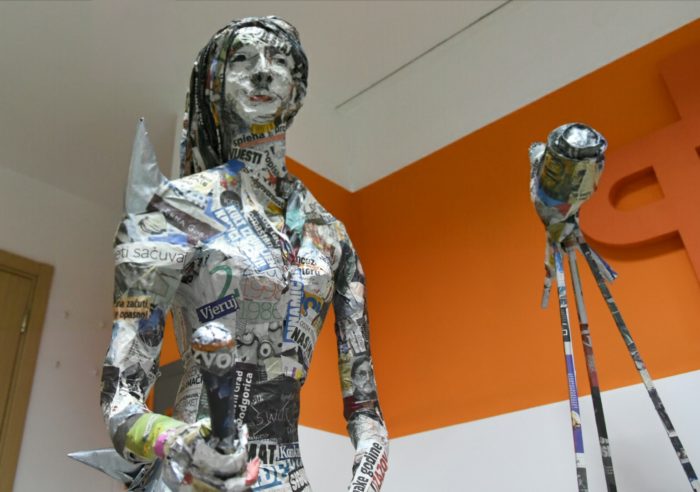
PODGORICA, 26.02.2018. – When in 2002 a joint Code of Journalists of Montenegro was adopted, even the worst pessimists could not predict that the next phase of self-regulation in Montenegrin media would be thus slow. Although sixteen years passed since five relevant media and journalists’ associations signed the Code text, which was made by the joint working group, united self-regulatory body in Montenegro still does not exist – body tasked to monitor the Code application, which in the meantime has also undergone one change.
Initially, the experimental phase which entailed the analysis of media content and identification of the Code violation ended with the quarrel and disintegration of the self-regulatory body at the beginning of 2010. Divisions within media community, which were induced from the political sphere, affected self-regulation as a strong frost gentle plant.
Several attempts initiated by the Delegation of the European Union and the OSCE Mission in Montenegro followed in order to restore unity and establish a new joint self-regulatory body, but lack of interest and open obstruction undermined these efforts. As this was presented as one of the conditions set for Montenegro in the process of joining the European Union, the attempt of Montenegrin President Filip Vujanović to sponsor a unique self-regulation was also futile.
This external, political reason motivated a group of twenty media, recognized as more or less close to the current Montenegrin authorities, to establish the Media Council for Self-Regulation (MCS) in March 2012. Its functioning for the first two years was financed from the state budget and money from the international donation.
MCS was never joined by two most circulating daily newspapers (Dan, Vijesti), one of the most influential commercial television stations in the country (TV Vijesti) and the only political weekly in Montenegro (Monitor). They later, on the recommendation of local NGO Human Rights Action, established an Ombudsman institution. MCS did not gather as well local printed and electronic media, so they founded their self-regulatory body, which completely disappeared after the initial activity.
MSS failed to impose itself as impartial and credible promoter of journalistic ethics and guardian of the Code of Journalists of Montenegro. According to the analysis of Human Rights Action (this NGO monitored the self-regulatory practice in Montenegro for two years, analyzed it and made recommendations), MCS was much more rigorous when assessing content of media that are not its members.
When considering complaints against media that are not its members, MCS has disregarded the prescribed procedure. It did not stop with this practice even after these media established their own self-regulatory bodies (ombudsmen). Disregarded were also suggestions of experts provided with good intentions. Suggestions were accepted by MCS only in mid-2017, preceded by a new attempt of the OSCE Mission to Montenegro to establish a unique self-regulation or, at least, cooperation.
In this new attempt, OSCE Mission set a minimalistic goal – to jointly amend and supplement the existing Code of Journalists of Montenegro, which has been accepted from all media and journalists since the beginning. The working group, which was empowered by the OSCE expert, with the coordination of the OSCE and the Council of Europe, has finalized the work on the new version of the Code at the end of 2015. The joint work on the Code amendments was a step that indicated the possibility of a gradual overcoming of differences within the media and journalistic community and the establishment of a single self-regulatory body. Unfortunately, it remained only an indication.
This joint work, however, has created the prerequisites for some kind of co-operation on the promotion of journalistic ethics and eliminated misunderstandings regarding MCS – ombudsman relations. MCS has abandoned the practice of resolving complaints and appeals against media that are not its members and acknowledged the fact that it is not the sole and exclusive guardian of the Journalistic Code of Ethics.
When it changed its Statute, MCS failed to accept further recommendations of the Human Rights Action. It failed to prescribe within the Statute or Rules of Procedure of the Appeals Commission binding sanctions for media which violate the Code.
Unlike, rules of procedure on ombudsmen work of Daily Dan and Vijesti, and Weekly Monitor, the Rules of Procedure of MCS Monitoring and Appeals Commission did not specify the procedure for mediation between the injured party and the media.
MCS Monitoring and Appeals Commission continues to be dominated by journalists /editors employed in media which are MCS members, the same is also with the person performing administrative duties in MCS, although its Statute has foreseen experts.
MCS Monitoring and Appeals Commission, as well as the ombudsmen, are now primarily deciding on appeals, while prevention and educational practice remain underdeveloped.
 This article has been produced as a part of the project Western Balkan’s Regional Platform for advocating media freedom and journalists’ safety with the financial assistance of the European Union. The contents of this article are the sole responsibility of the Independent Journalists’ Association of Serbia and its authors, and can in no circumstances be regarded as reflecting the position of the European Union.
This article has been produced as a part of the project Western Balkan’s Regional Platform for advocating media freedom and journalists’ safety with the financial assistance of the European Union. The contents of this article are the sole responsibility of the Independent Journalists’ Association of Serbia and its authors, and can in no circumstances be regarded as reflecting the position of the European Union.